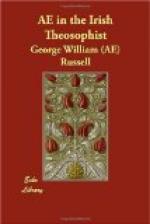We turned back mad from the mystic mountains
All
foamed with red and with faery gold;
Up from the heart of the twilight’s fountains
The
fires enchanted were starward rolled.
We turned back mad—we thought of the morrow,
The
iron clang of the far-away town:
We could not weep in our bitter sorrow
But
joy as an arctic sun went down.
—May 15, 1896
Works and Days
When we were boys with what anxiety we watched for the rare smile on the master’s face ere we preferred a request for some favor, a holiday or early release. There was wisdom in that. As we grow up we act more or less consciously upon intuitions as to time and place. My companion, I shall not invite you to a merrymaking when a bitter moment befalls you and the flame of life sinks into ashes in your heart; nor yet, however true and trusted, will I confide to you what inward revelations of the mysteries I may have while I sense in you a momentary outwardness. The gifts of the heart are too sacred to be laid before a closed door. Your mood, I know, will pass, and tomorrow we shall have this bond between us. I wait, for it can be said but once: I cannot commune magically twice on the same theme with you. I do not propose we should be opportunists, nor lay down a formula; but to be skillful in action we must work with and comprehend the ebb and flow of power. Mystery and gloom, dark blue and starshine, doubt and feebleness alternate with the clear and shining, opal skies and sunglow, heroic ardor and the exultation of power. Ever varying, prismatic and fleeting, the days go by and the secret of change eludes us here. I bend the bow of thought at a mark and it is already gone. I lay the shaft aside and while unprepared the quarry again fleets by. We have to seek elsewhere for the source of that power which momentarily overflows into our world and transforms it with its enchantment.
On the motions of an inner sphere, we are told, all things here depend; on spheres of the less evanescent which, in their turn, are enclosed in spheres of the real, whose solemn chariot movements again are guided by the inflexible will of Fire. In all of these we have part. This dim consciousness which burns in my brain is not all of myself. Behind me it widens out and upward into God. I feel in some other world it shines with purer light: in some sphere more divine than this it has a larger day and a deeper rest. That day of the inner self illuminates many of our mortal days; its night leaves many of them dark. And so the One Ray expanding lives in many vestures. It is last of all the King-Self who wakes at the dawn of ages, whose day is the day of Brahma, whose rest is his rest. Here is the clue to cyclic change, to the individual feebleness and power, the gloom of one epoch and the glory of another. The Bright Fortnight, the Northern




